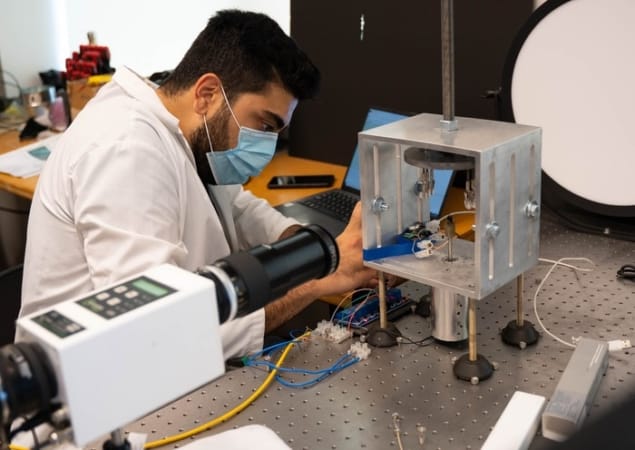Nanoparticles in fuel could boost aircraft efficiency
02 Dec 2021
The simple addition of nanoparticles to a hydrocarbon fuel can significantly change the characteristics of its combustion, researchers in Canada have discovered. By doping liquid ethanol with tiny particles of graphene oxide under varying conditions, Sepehr Mosadegh and colleagues at the University of British Columbia Okanagan Campus and Zentek in Thunder Bay Ontario showed how the additive can boost the breakdown of the fuel into tiny liquid droplets. Their discovery could one day lead to enhanced fuels for aircraft engines – making them both greener and more powerful.
In several recent studies, researchers have explored how the combustion characteristics of hydrocarbon fuels can be improved by the addition of nanoparticles. Now, Mosadegh and colleagues have studied how nanoparticles enhance atomization in liquid fuels. Atomization involves a liquid forming tiny droplets, which allow for more effective combustion.
There is still much to learn about certain aspects of this process including the rate at which atomization occurs and how atomization affects the rate at which fuel burns. To study the effect further, the team doped a pure ethanol fuel with three different types of graphene oxide nanoparticle – each oxidized to varying degrees. In addition, the team varied conditions including the nanoparticle concentration in the fuel; the fuel’s temperature; and the sizes of the nanoparticles.
Ultra-high-speed camera
For each measurement, the researchers used a combination of infrared spectroscopy, and an ultrahigh-speed camera, to quantify how these variables affected the quality of combustion. They were particularly interested in measuring the ignition delay, which is the time between fuel injection and the start of combustion. They also looked at the rate at which the fuel burned, and the speed at which the ethanol was atomized.READ MORE

Through their experiments, Mosadegh and colleagues discovered that burning rates could be enhanced by increasing nanoparticle concentrations to 0.1%, while using reduced graphene oxide as the dopant. This provided the best possible conditions for rapid heat transfer throughout the ethanol: triggering intense atomization. In the best cases, the fuel’s burning rate could be enhanced by up to 8.4%.
These results could have important implications for many applications that use hydrocarbons as a fuel source. In particular, Mosadegh’s team proposes that aircraft engines that run on nanoparticle-doped fuels could emit lower amounts of carbon; while simultaneously becoming more powerful. If achieved on commercial scales, this innovation could be a crucial step forward in urgently needed efforts to reduce carbon-dioxide emissions by the aviation industry.
The research is described in Combustion and Flame.
Sam Jarman is a science writer based in the UK
from physicsworld.com 17/12/2021

Δεν υπάρχουν σχόλια:
Δημοσίευση σχολίου